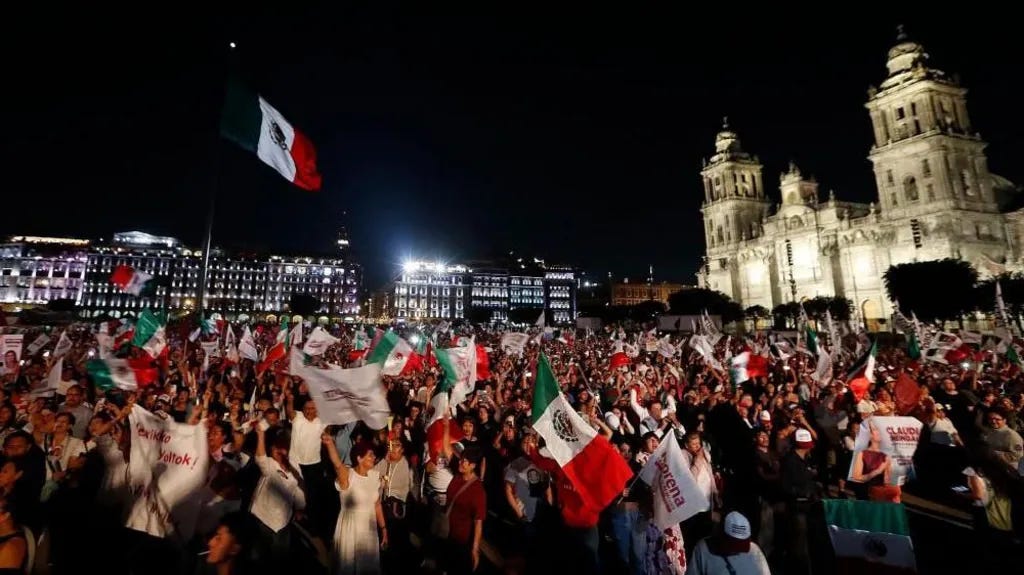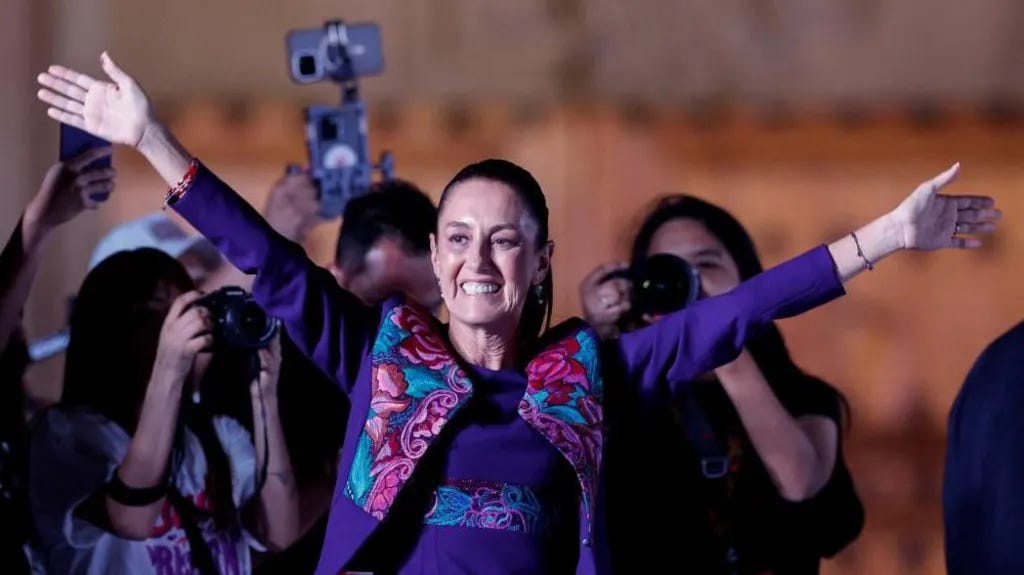Mexico Set to Get Its First-Ever Woman President: A Historic Milestone
Claudia Sheinbaum faces significant challenges as she prepares to assume office on 1st October 2024.
Claudia Sheinbaum's Historic Victory
Claudia Sheinbaum's election as the first female president of Mexico marks a significant milestone in the country's 200-year history as a republic. Running as the candidate of the ruling MORENA party, Sheinbaum secured a landslide victory, receiving between 58.3% and 60.7% of the vote according to a rapid sample count by Mexico's electoral authority, released in the early hours of Monday morning. This achievement not only breaks a long-standing gender barrier but also sets a new record for the highest vote percentage in Mexico's democratic history. Her main challenger, Xóchitl Gálvez of the opposition party, conceded defeat after receiving between 26.6% and 28.6% of the vote. Sheinbaum's victory is a testament to her popularity and the widespread support for her vision for Mexico's future.
The Significance of Her Presidency
Claudia Sheinbaum won a landslide victory to become Mexico's first female President, inheriting the project of her mentor and outgoing leader Andrés Manuel López Obrador, whose popularity among the poor significantly contributed to her triumph. A climate scientist and former Mayor of Mexico City, Sheinbaum's presidency represents a transformative step forward for Mexico, a nation deeply rooted in traditional and often patriarchal values. Her rise to the highest office is particularly remarkable in a country with the world's second-largest Roman Catholic population, which has historically upheld more conventional roles for women.
Sheinbaum's success signifies a broader societal shift towards gender equality and the empowerment of women in Mexico, reflecting a growing acceptance and support for female leadership across North America. This historic election not only shatters a significant gender barrier but also paves the way for future generations of women to aspire to and achieve leadership positions in Mexico and beyond.

Mexico: A Nation of Diversity and Growth
Mexico, officially known as the United Mexican States, attained its independence from Spain on September 16, 1810. Covering an area of approximately 1.96 million square kilometres, Mexico is about 3/5th of the size India. It shares a significant land border with the United States, stretching over 3,145 kilometres. With a population of around 129 million, Mexico is the tenth most populous country globally, yet much smaller in comparison to the United States, which has a population exceeding 330 million.
Spanish is the predominant language spoken in Mexico, reflecting its colonial past. Economically, Mexico boasts a robust and diverse economy, being the 15th largest globally by nominal GDP. The country's population is ethnically diverse, with around 60% identifying as Mestizo (mixed European and Indigenous ancestry), 30% as predominantly Indigenous, and the remaining 10% as European, African, and other ethnicities. Indigenous peoples, such as the Nahua, Maya, and Zapotec, comprise a significant portion of the population and contribute to the rich cultural heritage of the nation.
Challenges Ahead
Despite her historic victory, Sheinbaum faces a complex and challenging path ahead. She must balance her promises to expand social welfare policies with the need to address Mexico's hefty budget deficit and low economic growth. Additionally, the surging problem of organized crime poses a significant challenge. The election cycle was the most violent in Mexico's modern history, with 38 candidates murdered. Sheinbaum's ability to improve security will be critical to her administration's success. Analysts emphasize the need for a substantial investment in policing and reducing impunity to achieve meaningful improvements in overall security levels.
Dealing with Drug Cartels
One of Claudia Sheinbaum's most pressing challenges as Mexico's president is tackling the pervasive influence of drug cartels. These criminal organizations have deep-rooted control over various regions, diversifying their activities beyond drug trafficking to include extortion, human smuggling, and even control over local governments. The last election cycle, marked by unprecedented violence with 38 candidates murdered, underscores the magnitude of the security crisis. To address this, Sheinbaum will need to implement a comprehensive strategy that combines robust law enforcement measures with social programs aimed at reducing the economic incentives for joining cartels. However, given the cartels' extensive resources and entrenched presence, achieving significant progress will be a formidable task.
The Issue of Illegal Migration Across the US Border
The issue of illegal migration remains a significant challenge for Sheinbaum's administration. Mexico is a key transit country for migrants from Central and South America attempting to enter the United States. This situation places considerable strain on Mexico's resources and complicates its relationship with its northern neighbour. The Biden administration has faced record numbers of migrants at the US-Mexico border, driven by factors such as economic hardship, violence, and political instability in their home countries. Sheinbaum will need to adopt stringent measures to manage this flow while fostering closer cooperation with the US on border security. This could involve increased enforcement at Mexico's southern border and more robust policies to address the root causes of migration.
Domestic Economy Issues and Fiscal Stress
Sheinbaum's presidency also inherits significant economic challenges. Despite the outgoing administration's successes in reducing poverty and strengthening the peso, Mexico faces a hefty budget deficit and sluggish economic growth, with the central bank projecting just 1.5% GDP growth in 2025. Sheinbaum has pledged to expand social welfare programs, a cornerstone of her mentor Andrés Manuel López Obrador's policies. However, financing these initiatives will be challenging amid fiscal constraints. The state oil company, Pemex, is drowning in debt and has seen declining production for two decades, requiring a reevaluation of its business model. Addressing these economic issues will require a delicate balance between maintaining fiscal responsibility and pursuing progressive social policies.
Strengthening US-Mexico Relations
As President, Sheinbaum will need to navigate tense negotiations with the United States, particularly concerning the large flows of U.S.-bound migrants crossing Mexico and security cooperation over drug trafficking. The U.S. fentanyl epidemic and its implications for bilateral relations will be a critical area of focus. Mexican officials anticipate more challenging negotiations if Donald Trump wins the U.S. presidency in November. Sheinbaum's administration will also need to address issues related to trade, environmental policies, and the economic integration of the two countries.
India-Mexico Relations
India and Mexico share a robust and multifaceted relationship that spans diplomatic, economic, and cultural dimensions. Diplomatic relations were formally established in 1950, with Mexico being the first Latin American nation to recognize India's Independence in 1947. Over the decades, high-level visits and bilateral agreements have strengthened ties. Economically, bilateral trade reached $11.4 billion in 2022, making India Mexico's 10th largest trade partner. Indian investments in Mexico are substantial, particularly in the IT, pharmaceutical, and automotive sectors, amounting to around $4 billion. Culturally, extensive exchanges foster people-to-people connections, further solidifying the bilateral relationship. The future of India-Mexico relations looks promising, with both countries committed to deepening their strategic partnership and addressing mutual challenges through cooperation.
Looking Forward with Optimism
Claudia Sheinbaum's presidency is ushering in a new era of optimism for Mexico. Her historic election is not just a victory for gender equality but also a beacon of hope for progressive change. While the challenges she faces are significant, her leadership promises a continuation of the social welfare policies that have benefited many Mexicans. With a strong mandate and potential supermajority in Congress, Sheinbaum has the political capital to implement meaningful reforms. The world watches with anticipation as Mexico, under her leadership, strides forward with robust optimism towards a brighter future.





